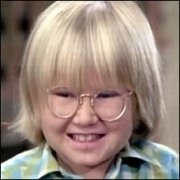It’s 8/8/08, the day Julie Epelboim would have turned 44. 4+4 is 8. 44 is half of 88. Julie was born on 8/8/64, and 8×8 is 64.
I mention these things not to be glib about my friend who succumbed to cancer at age 36 (which is 44 minus 8), but because she would have taken delight in these simple number patterns. I still remember how excited we were when she turned 24 (which is 8+8+8) on 8/8/88.
Yes, we were nerds, but that was the whole point. It was my great good fortune to befriend a smart, sexy girl who was actually attracted to math nerds. What would I have done otherwise?
It happened like this. When I arrived in Pittsburgh I was three hundred or more miles away from everyone that I knew, the state’s motto — “You’ve got a friend in Pennsylvania” — notwithstanding. I spent a few days envying the busy social life of my roommate Joe, who was a Pittsburgh native. Classes had not yet really gotten underway and there was little to do other than attend a few orientation events, buy textbooks and supplies, and feel lonely.
Finally I set out for campus one afternoon with the specific intention of making some new friends. Pretending to be confident, I spotted a group of freshmen chatting in the student center, listened in on their conversation, and broke into it at the first opportunity. One of the freshmen was Julie; another was David, her brand-new boyfriend. A third was Julie’s roommate Michelle, whom I dated for a couple of months. For a while, she and I and David and Julie were an inseparable foursome. Later, Michelle was out of the picture but David, Julie, and I continued to have adventures together of various kinds.
Time passed. I’d come to Carnegie Mellon to learn computer science, but after three semesters I still hadn’t had any computer classes. (I’d aced the first-ever Computer Science AP exam in 1984 and so placed out of CMU’s introductory courses.) So by the fall of 1985 my interest in school was almost nil and my grades showed it. I was placed on academic suspension! I remained in town, though, taking a class and a part-time job at the University of Pittsburgh down the road and keeping in touch with my friends. During that time I contemplated a career as a writer rather than as a computer scientist, and in fact I applied to transfer to Hampshire College, a liberal-arts school in Massachusetts.
But then two things happened. First, David and Julie, still together after more than a year, had hit a prolonged rough patch in their relationship. Julie started spending more of her time with me, her oldest other college friend. Suddenly, thanks to the magical power of alcohol, one night we were fooling around, and in the following days and weeks we kept it up. I hated cuckolding my friend but it was just what I needed.
Second, thanks to spending more time with Julie, I was exposed to Carnegie Mellon’s first wave of non-introductory computer-science courses, which she had finally reached. I helped her often with her homework. By the time I heard from Hampshire College admissions — my application was approved! — my enthusiasm for computer science had returned with such vigor that I was able to talk the dean into ending my suspension a semester early. That fall I was a CMU computer science student again and kicking academic ass.
Julie helped to ensure my life turned out the way it has in a variety of ways. Getting me back into computer programming was one. Being the reason I met Steve — my friend, frequent co-worker, and future business partner — was another. Her perspective on the world — she’d grown up in Moscow, which was unspeakably exotic to me — broadened my narrow one.
None of which is to overlook her other important contribution to my future: in a word, sex. Andrea won’t like my recalling this so publicly (or, really, at all), but the fact is that if it hadn’t been for Julie, then by the time I met Andrea I would still have had too many wild oats left to sow. We could never have built the life together that we have.
In fact I started becoming friendly with Andrea around the same time that my friendship with Julie was winding down — that same summer of ’88, when Julie turned 8+8+8, we all graduated, and she made plans to leave Pittsburgh for grad school in the fall. (By then I was employed by CMU and remained for another four years.) On the one or two brief occasions that their paths crossed, Andrea, sensing my fondness for Julie, regarded her askance. (Andrea’s dog, Alex, must have picked up on her coolness toward Julie, for when Julie made a surprise visit a couple of years later to attend a housewarming party we were throwing, Alex — who loved everyone, sometimes to a fault — immediately began snarling at her!)
More time passed. Julie got married, had a son, earned a doctoral degree. Andrea and I moved to California and had our own adventures. I remained in occasional e-mail contact with Julie; once in a while we’d forward one another something funny from the web, or something nostalgic, such as when someone else had the idea of naming a computer matchmaking service “Yenta.”
I think it was late 1999 — when Andrea and I finally got married, incidentally — that I learned Julie was having some medical problems, apparently a complication from the Crohn’s disease she’d suffered most of her life. When I corresponded with her again a few months later I was dismayed to learn her problems were continuing. By the fall of 2000 she was fighting a major cancer battle. To her lasting credit, Andrea urged me to visit Julie in Maryland where she was hospitalized in an ultra-sterile cancer ward getting powerful chemo treatments.
I spent a few days chatting with her, reading to her, running errands for her and her family, removing myself when the doctors wanted to practice medicine on her or when the drugs — Gemzar and Taxotere, I somehow remember very clearly — made her too sick to tolerate company.
She was brave and in good spirits but confided in me toward the end of my visit that she didn’t think she’d win the battle. By that point she’d been released from the hospital, I’d helped her family get her settled back at home, and I thought things were looking up for her. Her flat self-prognosis frightened me, so I put on a brave face, pooh-pooh’d her pessimism, and promised her what ongoing support I could.
After I got back to California I sent her a postcard or a letter about once each week on any random subject to keep her connected with the living world. The then-current Florida election struggle was a frequent topic. After a while I started to get miffed, in spite of myself and of knowing what she was going through, that she hadn’t sent a reply — hadn’t even dictated a postcard — even once.
On January 13th I got a call from David. Julie and her family had traveled to Mexico for some promising cancer treatment that was not yet FDA-approved, so not available in the U.S. While there she slipped into a coma from which she never awoke. She was dead.
The news knocked the wind out of me. I spread the news to some friends and they were likewise crushed. I sent these condolences to Julie’s parents, whom I’d known and admired for almost half their daughter’s life:
The last communication I had from Julie was when she left a very garbled (because of cell phone interference) message on my answering machine around Thanksgiving. I couldn’t make out much of what she said, but it sounded like she was calling the people she felt thankful to have in her life. That message, and some of the things she said when I visited her, make me feel certain that, though she had to endure a terrible ordeal, she knew she was surrounded by many people who loved her. She was thankful for my friendship — and I was only the least of a generous phalanx of very supportive friends and relatives.
Julie should have had a much longer life, but it seems to me she could hardly have hoped for a better one. She enjoyed academic and professional success; had an amazing family and true friends who genuinely cared for her; raised an incredible little boy who has wit, intelligence, and a disposition far beyond his years; and had lots and lots of fun.
Julie was my companion during the time in my life that I was growing from a provincial, pretentious kid into a mellow, mature adult. I learned a lot from her and remain surrounded by numerous reminders of how she helped me to become who I am. In a very real sense, she left a part of herself with me, and as long as I’m drawing breath, that part of her will live, too.
It’s hard to imagine now, but once upon a time, before Revenge of the Nerds, the old stereotypes about nerds were largely true: socially inept, unworldly, preoccupied with abstractions and fantasy. Julie was the first person I’d ever met who had one foot in that world — we debated Star Trek and played Rogue together — and one in the world of finer things: good food (we dined out many times on her aunt’s credit card), poetry (in high school she’d written a truly affecting love poem to resemble a program in the computer language BASIC), animals (her cat won awards at purebreed shows), but mostly other people. Today most “computer nerds” can probably be said to have a greater, healthier breadth of interests than in the past. I certainly do. Julie was the prototype.

 Nerd confession: I just realized that my son Archer, who is 4, and my stepdaughter Pamela, who just turned 27, both have ages that can be expressed in the form nn — Archer is 22 and Pamela is 33. Barring a major advance in gerontology research I regret to say it is unlikely any of us will ever see 44.
Nerd confession: I just realized that my son Archer, who is 4, and my stepdaughter Pamela, who just turned 27, both have ages that can be expressed in the form nn — Archer is 22 and Pamela is 33. Barring a major advance in gerontology research I regret to say it is unlikely any of us will ever see 44.